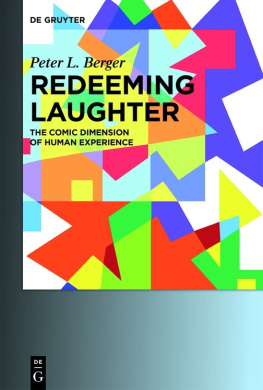Berger - Extremism
Here you can read online Berger - Extremism full text of the book (entire story) in english for free. Download pdf and epub, get meaning, cover and reviews about this ebook. City: Cambridge;MA, year: 2018, publisher: MIT Press, genre: Politics. Description of the work, (preface) as well as reviews are available. Best literature library LitArk.com created for fans of good reading and offers a wide selection of genres:
Romance novel
Science fiction
Adventure
Detective
Science
History
Home and family
Prose
Art
Politics
Computer
Non-fiction
Religion
Business
Children
Humor
Choose a favorite category and find really read worthwhile books. Enjoy immersion in the world of imagination, feel the emotions of the characters or learn something new for yourself, make an fascinating discovery.
Extremism: summary, description and annotation
We offer to read an annotation, description, summary or preface (depends on what the author of the book "Extremism" wrote himself). If you haven't found the necessary information about the book — write in the comments, we will try to find it.
Berger: author's other books
Who wrote Extremism? Find out the surname, the name of the author of the book and a list of all author's works by series.
Extremism — read online for free the complete book (whole text) full work
Below is the text of the book, divided by pages. System saving the place of the last page read, allows you to conveniently read the book "Extremism" online for free, without having to search again every time where you left off. Put a bookmark, and you can go to the page where you finished reading at any time.
Font size:
Interval:
Bookmark:
The MIT Press Essential Knowledge Series
Auctions, Timothy P. Hubbard and Harry J. Paarsch
The Book, Amaranth Borsuk
Carbon Capture, Howard J. Herzog
Cloud Computing, Nayan Ruparelia
Computing: A Concise History, Paul E. Ceruzzi
The Conscious Mind, Zoltan L. Torey
Crowdsourcing, Daren C. Brabham
Data Science, John D. Kelleher and Brendan Tierney
Extremism, J. M. Berger
Free Will, Mark Balaguer
The Future, Nick Montfort
Haptics, Lynette A. Jones
Information and Society, Michael Buckland
Information and the Modern Corporation, James W. Cortada
Intellectual Property Strategy, John Palfrey
The Internet of Things, Samuel Greengard
Machine Learning: The New AI, Ethem Alpaydin
Machine Translation, Thierry Poibeau
Memes in Digital Culture, Limor Shifman
Metadata, Jeffrey Pomerantz
The MindBody Problem, Jonathan Westphal
MOOCs, Jonathan Haber
Neuroplasticity, Moheb Costandi
Open Access, Peter Suber
Paradox, Margaret Cuonzo
Post-Truth, Lee McIntyre
Robots, John Jordan
Self-Tracking, Gina Neff and Dawn Nafus
Sustainability, Kent E. Portney
Synesthesia, Richard E. Cytowic
The Technological Singularity, Murray Shanahan
Understanding Beliefs, Nils J. Nilsson
Waves, Frederic Raichlen
J. M. Berger
The MIT Press
Cambridge, Massachusetts
London, England
2018 Massachusetts Institute of Technology
All rights reserved. No part of this book may be reproduced in any form by any electronic or mechanical means (including photocopying, recording, or information storage and retrieval) without permission in writing from the publisher.
This book was set in Chaparral Pro by Toppan Best-set Premedia Limited. Printed and bound in the United States of America.
Library of Congress Cataloging-in-Publication Data
Names: Berger, J. M. (John M.), 1967- author.
Title: Extremism / J. M. Berger.
Description: Cambridge, MA : The MIT Press, 2018. | Series: The MIT press essential knowledge series | Includes bibliographical references and index.
Identifiers: LCCN 2018007483 | ISBN 9780262535878 (pbk. : alk. paper)
eISBN 9780262349352
Subjects: LCSH: Radicalism. | Political violence.
Classification: LCC HN49.R33 B464 2018 | DDC 303.48/4--dc23 LC record available at https://lccn.loc.gov/2018007483
ePub Version 1.0
The MIT Press Essential Knowledge series offers accessible, concise, beautifully produced pocket-size books on topics of current interest. Written by leading thinkers, the books in this series deliver expert overviews of subjects that range from the cultural and the historical to the scientific and the technical.
In todays era of instant information gratification, we have ready access to opinions, rationalizations, and superficial descriptions. Much harder to come by is the foundational knowledge that informs a principled understanding of the world. Essential Knowledge books fill that need. Synthesizing specialized subject matter for nonspecialists and engaging critical topics through fundamentals, each of these compact volumes offers readers a point of access to complex ideas.
Bruce Tidor
Professor of Biological Engineering and Computer Science
Massachusetts Institute of Technology
As always, I am deeply indebted to many people who helped me along the way to this book. Most of the concepts discussed herein were developed with support and guidance from Alastair Reed, head of the Counter-Terrorism Strategic Communications Project. I am grateful for his friendship and support.
The work of Haroro J. Ingram, published through the International Centre for Counter-TerrorismThe Hague and the CTSC Project, was deeply influential on my own. I benefited greatly from our conversations and his feedback in general and on this manuscript. The direction of this work also was shaped by his critical contributions regarding messaging broadly and his development of crucial elements of theory regarding crisis and solution constructs. His publications, cited in the bibliography, are highly recommended as a companion to this book. The work of Michael Hogg on uncertainty and extremism, and the work of others building on his concepts, also influenced on this work in very important ways.
This book came about after I gave a lecture at a conference at the Paris Institute for Advanced Study (Paris IAS), where I met MIT Press editor Matthew Browne. Thanks are due to Itzhak Fried, who organized that fascinating event, and Jessica Stern, my friend and past collaborator, who brokered my invitation and whose support in general has opened many doors for me. Thanks also to Anne-Marie Bono of the MIT Press, for guiding the process of publication and to my agent, Martha Kaplan. Thanks also to Maura Conway and Lisa McInerney of VOX-Pol for their support of this book and other generosities.
Finally, and most of all, this book and all my work in this field, and pretty much all of the good things in my life in general, would not be possible without the love and support I have received from my wife, Janet.
In a 1964 U.S. Supreme Court opinion attempting to define pornography for legal purposes, Justice Potter Stewart summed up the nebulous nature of the concept in seven now-infamous words. He couldnt offer a workable definition, he wrote, but I know it when I see it.
More than fifty years later, we find this test applied to one of the worlds most pressing problems, a rising tide of extremist movements that are destabilizing civil societies around the globe. Virtually everyone acknowledges the severity of the threat, but extremism is still most often classified according to Stewarts criteria: we know it when we see it. And as with pornography, we do not all agree about what passes the test.
The dictionary definition is circular: extremism is the quality or state of being extreme or the advocacy of extreme measures or views. In politics, extremism is an increasingly convenient insulta way to characterize and condemn what the other guys believe.
The flaws in these definitions should be apparent. A circular definition (extremists are extreme) is meaningless and highly vulnerable to abuse because it can apply to anyone whose views you disagree with. A definition that specifies a religious dimension excludes secular movements and vice versa. A definition predicated on violence excludes a world of movements that we know when we see them, such as some segregationists, the alt-right, and at least some branches of the Muslim Brotherhood. A definition based on the norms or center of a society is especially perilous because it excludes successful and important historical extremist regimes, such as institutionalized racial slavery in America and Nazi Germany.
The answer to the question What is extremism? seems like it should be obvious, but it definitely isnt. And in a world where violent extremism is widely acknowledged as a defining challenge of our age, that failure of definition has huge real-world consequences.
In the United States, the term extremist is frequently hurled, shorn of context, across racial and partisan divides. Many in the wider West contend that the entire religion of Islam is inherently extreme, arguing for policies that range from the curtailment of civil rights to mass internment. Within Islam itself, furious debates rage about which sect, movement, or nation is normative and which is extremist.
Next pageFont size:
Interval:
Bookmark:
Similar books «Extremism»
Look at similar books to Extremism. We have selected literature similar in name and meaning in the hope of providing readers with more options to find new, interesting, not yet read works.
Discussion, reviews of the book Extremism and just readers' own opinions. Leave your comments, write what you think about the work, its meaning or the main characters. Specify what exactly you liked and what you didn't like, and why you think so.


















